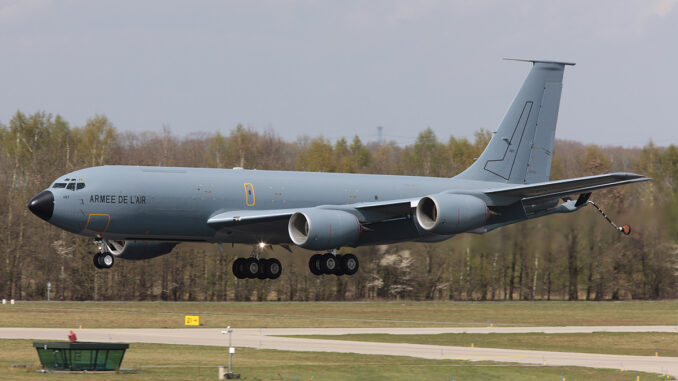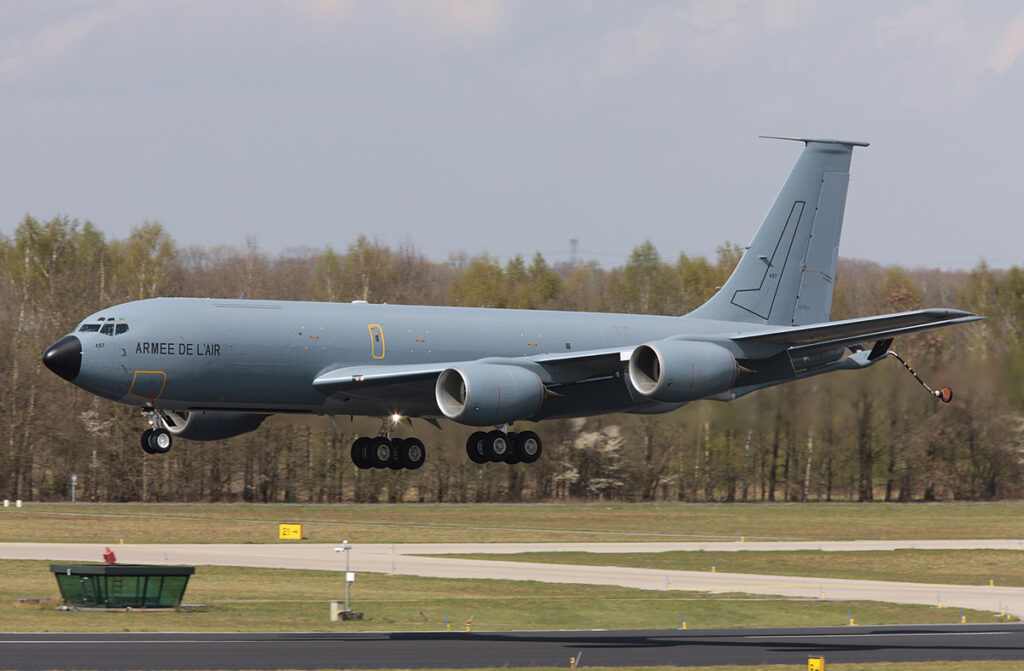
Metrea, a private aerospace company, has acquired 14 KC-135 tankers from the French Air Force, expanding its fleet to meet military opportunities.
Metrea, a private aerospace company, has recently acquired 14 KC-135 tankers from the French Air Force. This strategic acquisition, comprising 11 KC-135FRs and 3 KC-135RGs, significantly strengthens Metrea’s fleet, positioning it as the fifth largest tanker operator in the world. The aircraft, initially used by France since 1964, were modernised in the 1980s and 2010s to meet current standards. This initiative is designed to meet the growing need for aerial refuelling, particularly for the US Army and its allies. Metrea plans to put these aircraft back into service by 2025, despite the challenges associated with their maintenance and age.
A strategic acquisition
In June 2023, the private aerospace company Metrea made a major strategic acquisition by purchasing 14 KC-135 tankers from the French Air Force. The deal, aimed at strengthening the company’s air-to-air refuelling capability, marks a crucial milestone for Metrea, which is now positioned as the world’s fifth largest tanker operator. This article explores the details of the acquisition, the advantages and disadvantages of the KC-135, and the implications for the armed forces and the aerospace market.
Details of the acquisition
Metrea has acquired 11 KC-135FRs and is still awaiting delivery of 3 KC-135RGs. These aircraft, which have been in service with France since 1964, were modernised in the 1980s with new CFM56 engines, and in the 2010s with avionics upgrades for the KC-135RG. The cost of the deal was not disclosed, but it includes under-wing refuelling pods and other ancillary equipment.
KC-135 history and maintenance
KC-135s have a long history of service, beginning with the US Air Force in the 1950s. The KC-135FR model, used by France, was upgraded with CFM56 engines, improving fuel efficiency and reducing maintenance costs. However, these aircraft still require regular maintenance to remain operational. Metrea plans to return the first of these tankers to service within 30 to 45 days of acquisition, with full return to service by 2025.

Advantages of the KC-135
The KC-135 has several distinct advantages:
- Refuelling versatility: These aircraft can provide in-flight refuelling to aircraft using both boom and probe-bin methods. This versatility is essential for joint operations between US and allied forces.
- Reliability: With a mission reliability of 93%, the KC-135 has proven its robustness and effectiveness in a variety of missions.
- Support ecosystem: A vast maintenance and spare parts network already exists, facilitating the maintenance and repair of these aircraft.
- Expertise available: A large proportion of the crews and maintenance personnel are already trained and experienced with the KC-135, which reduces training costs and time for Metrea.
Disadvantages of the KC-135
Despite their advantages, KC-135s also present challenges:
- Aircraft age: KC-135s are older aircraft, which can pose long-term maintenance and cost issues.
- Outdated technology: Although modernised, these aircraft do not have the latest technology, which can limit their operational efficiency compared with new models such as the KC-46.
- Parts availability: Despite an extensive support network, some specific parts can be difficult to find, increasing repair times.
Consequences of the acquisition
Metrea’s acquisition of these tankers has several important implications:
- Increased operational capability: Metrea is doubling its tanker fleet, increasing its ability to meet the growing demands for aerial refuelling, particularly from the US Army.
- Support for allies: The additional tankers will enable Metrea to support not only US forces, but also allies and partners through foreign military sales contracts.
- Reducing pressure on military tankers: By taking on non-combat missions, Metrea allows military tankers to focus on critical operations, especially in the event of a major conflict.
Future prospects
Metrea plans to continue exploring new opportunities with foreign armed forces. Direct sales contracts with countries lacking refuelling capabilities could be developed, offering a flexible and cost-effective solution to these nations. In addition, the integration of refuelling drones could represent a significant development, responding to the growing demand for refuelling unmanned aircraft.
Metrea’s acquisition of the French KC-135s represents a major strategic step forward for the company. By doubling its refuelling capacity and positioning itself as a key player in this field, Metrea is responding to growing demand from US and allied armed forces. Despite the challenges associated with maintaining these older aircraft, the advantages they offer in terms of versatility, reliability and logistical support make them a wise choice for the future. With growing opportunities both domestically and internationally, Metrea is well placed to play a crucial role in global aerial refuelling.
War Wings Daily is an independant magazine.